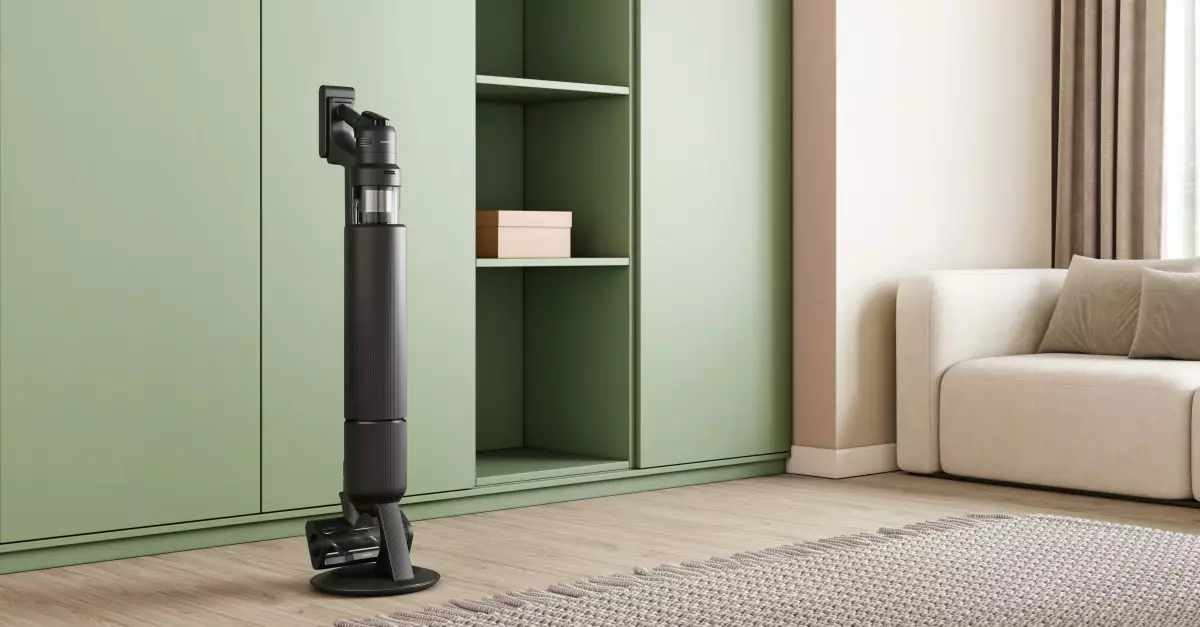In a world awash with notifications, Samsung is boldly stepping into the arena of connectivity with its latest offerings in the Bespoke AI line. Gone are the days of passive appliances; instead, we are ushered into an era where even tasks traditionally considered mundane—such as vacuuming or laundry—are transformed into opportunities for seamless communication. With the introduction of LCD screen technology in devices like the Bespoke Jet AI vacuum and its laundry appliances, Samsung exhibits a commitment to enhancing user experiences through technology. The strategic integration of messaging and call alerts directly into these machines represents an intriguing blend of utility and innovation, worth delving into.
Functional Genius: The Bespoke Jet AI Vacuum
Imagine a cordless vacuum, not only capable of 400AW suction power and a remarkable battery life of up to 100 minutes, but also equipped with an LCD control panel that keeps you updated on incoming calls and texts. This is precisely the value proposition of Samsung’s new Bespoke Jet AI vacuum, retailing at $1,099. In a chaotic household, particularly as we juggle work and home life, the ability to stay connected while performing chores is increasingly pertinent. Receiving alerts while vacuuming significantly reduces the chances of missing important calls, reinforcing the idea that home automation can genuinely enhance life quality rather than complicate it.
Reinventing Laundry Made Easy
Equally revolutionary is the Bespoke AI Laundry Vented Combo, priced at $3,099, which allows you to take conversations further—quite literally. With a 7-inch LCD touchscreen, users can engage with calls and texts without leaving their laundry tasks behind. However, the device also boasts automatic features that hold incredible value, like dispensing the right amount of detergent and automatically opening its door at the end of a cycle. This level of automation ensures that busy individuals can concentrate on what they need to do without losing focus on essential household duties.
A Unified Ecosystem of Convenience
Samsung has not just stopped at creating impressive individual devices; it is forging a cohesive ecosystem of smart appliances under the brand’s AI Home technology. The integration with Samsung’s SmartThings platform allows all appliances, from fridges to ovens, to interconnect seamlessly. Want to find a recipe? The smart fridge can identify ingredients through AI-powered cameras and send cooking instructions directly to the oven. With hands free for cooking, the entire household experience becomes interconnected and fluidly managed. Such advancements reflect not only technological innovation but a shifting paradigm in how we conceive of domestic life.
The Double-Edged Sword of Connectivity
However, this revolutionary shift does not come without its potential pitfalls. While the allure of interconnected appliances is undeniable, it raised some pressing concerns. The integration of screens into everyday appliances may be excessive and could lead to a decrease in usability if devices become obsolete. Moreover, the reliability of these touchscreens is under scrutiny; tactile knobs may be less prone to malfunction compared to their electronic counterparts.
Another gripping concern is privacy and potential ad placements. Given the trajectory of tech companies exploring advertisements on screens, such as in Amazon’s Echo Show, one must wonder if we are stylishly buying into devices that could serve ads instead of purely facilitating our lives. Although Samsung has yet to cross this line with its appliances, the looming question is undeniable: when does innovation turn into intrusive marketing?
A Paradigm Shift in Domestic Life
Samsung’s Bespoke AI line signifies a bold rethinking of traditional home appliances, merging functionality with cutting-edge features that foster connectivity. It urges consumers to reassess their relationship with technology, moving towards a household environment defined by convenience and a reduction in mundane tasks. Certainly, with the surge of smart technology, we find ourselves at a crossroads, pondering the balance between utility and the risks posed by increased reliance on interconnected devices.
The implications of this new landscape extend beyond mere convenience; they challenge us to reflect on how we interact with our home environments. As tech continues to infiltrate domestic spaces, questions about sustainability, usability, and the essence of the home will inevitably require thoughtful scrutiny. Ultimately, while Samsung is cultivating a vision of a smart home that works tirelessly to make our lives easier, it is imperative we stay alert to the broader implications of this transformative trend.


Leave a Reply